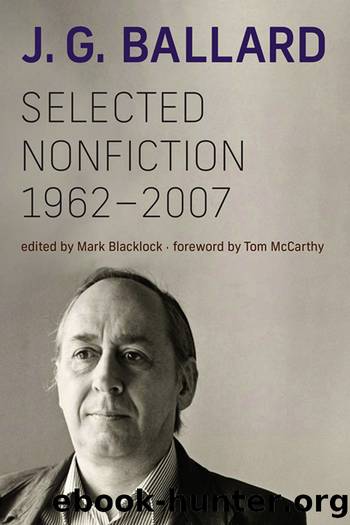Selected Nonfiction, 1962-2007 by J. G. Ballard

Author:J. G. Ballard [Ballard, J. G.]
Language: eng
Format: epub
Publisher: MIT Press
Published: 2023-10-04T00:00:00+00:00
Down to Earth
Spectrum IV, edited by Kingsley Amis and Robert Conquest; Telepathist by John Brunner; I Love Galesburg in the Springtime by Jack Finney; An Arthur C. Clarke Omnibus
Guardian (April 9, 1965)
During the past few years it has become apparent that science fiction, long regarded as a self-contained melange of post-Wellsian fantasies about time and space, is dividing itself into two separate and opposed forms. On the one hand is the traditional science fiction of interplanetary travel and alien cultures, in its heyday thirty years ago an authentic popular image of the future, but now identified with a few declining magazines and a group of older American and British writers unable to add anything substantially new to their repertory of ideas.
Their failure, and that of the entire genre, in spite of the heroic efforts of intelligent apologists such as Kingsley Amis and Edmund Crispin, not to mention the millions of dollarsâ worth of free publicity given by the Russo-American space programmes, lies in its mistaken appeal to realism rather than to fantasy. Once it gets off the ground into space all science fiction is fantasy, and the more serious it tries to be, the more naturalistic, the greater its failure, since it completely lacks the moral authority and conviction of a literature won from experience.
On the other hand there has emerged a more speculative form of science fiction, one that is crossing the horizon of general fiction at an increasing number of points. Where the older science fiction has been most involved with outer space, this new offshoot is concerned with âinner space,â the surrealistsâ âlandscapes of the soul,â and in creating images where the outer world of reality and the inner world of the psyche meet and fuse. Indeed, for these writers science serves much the same role as did psychoanalysis for the surrealistsâa standpoint rather than a subject matter. Recognising that the whole of science fictionâs imaginary universe has long since been absorbed into the general consciousness and that most of its ideas are valid only in a kind of marginal spoofing, as in William Burroughsâs The Ticket that Exploded, they have set about trying to create a new set of conventions with which to explore their subject matter. As distinct from the teleological ends of science fiction in the past, with its explicit social and moral preoccupations, the new science fiction is devoted to ontological objectivesâthe understanding of time, landscape, and identity.
This distinction between outer and inner space is apparent in the latest Kingsley Amis and Robert Conquest collection Spectrum IV. As usual, the sharpness of the editorial eye produces many stories that convince by sheer expertise, but the best are those, such as the late C. M. Kornbluthâs âThe Marching Moronsâ and John Brunnerâs âSuch Stuff,â which are extrapolations of the immediate present, nightmares at noon earned from the abrasive dust of the pavements we all walk.
Fantasy, always marginal to science fiction, succeeds like humour by an alchemy of its own. The pointed and amiable stories
Download
This site does not store any files on its server. We only index and link to content provided by other sites. Please contact the content providers to delete copyright contents if any and email us, we'll remove relevant links or contents immediately.
Cecilia; Or, Memoirs of an Heiress — Volume 1 by Fanny Burney(31353)
Cecilia; Or, Memoirs of an Heiress — Volume 3 by Fanny Burney(30951)
Cecilia; Or, Memoirs of an Heiress — Volume 2 by Fanny Burney(30909)
The Great Music City by Andrea Baker(21669)
We're Going to Need More Wine by Gabrielle Union(18088)
Bombshells: Glamour Girls of a Lifetime by Sullivan Steve(13121)
Pimp by Iceberg Slim(12950)
All the Missing Girls by Megan Miranda(12779)
Fifty Shades Freed by E L James(12466)
Talking to Strangers by Malcolm Gladwell(11911)
Norse Mythology by Gaiman Neil(11904)
Crazy Rich Asians by Kevin Kwan(8375)
Mindhunter: Inside the FBI's Elite Serial Crime Unit by John E. Douglas & Mark Olshaker(7852)
The Lost Art of Listening by Michael P. Nichols(6485)
Enlightenment Now: The Case for Reason, Science, Humanism, and Progress by Steven Pinker(6416)
Bad Blood by John Carreyrou(5784)
The Four Agreements by Don Miguel Ruiz(5534)
Weapons of Math Destruction by Cathy O'Neil(5050)
We Need to Talk by Celeste Headlee(4882)
